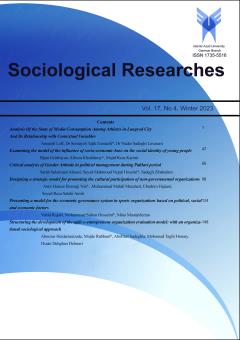Designing a strategic model for promoting the cultural participation of non-governmental organizations
Subject Areas :Amirhamzeh Bozorginia 1 * , Muhammad Mahdi Mezahari Tehrani 2 , Ebrahim Hajiani Hajiani 3 , Syed Reza Salehi Amiri 4
1 - Doctoral student of Azad University, Science and Research Department, Tehran
2 - Assistant Professor of Tehran University of Research Sciences
3 - Associate Professor of Sociology. Director of the Cultural and Social Research Department of Strategic Research Institute
4 - Associate Professor, Department of Cultural Management, Tehran University of Research Sciences
Keywords: Cultural participation, NGOs, cultural content, virtual space,
Abstract :
Abstract The research was conducted with the aim of designing a strategic model for promoting the cultural participation of non-governmental organizations with an emphasis on content production in cyberspace. The research was applied in terms of purpose and mixed simultaneously in terms of data. The statistical population was all experts in the field of cultural partnerships, non-governmental organizations and virtual space and all documents. Sampling of experts was done by snowball method and sampling of documents was done by available method. Data analysis was done by coding methods, content analysis, cross matrix analysis and SWOT analysis. Finally, the strategic model of promoting the cultural participation of non-governmental organizations in the production of cultural content in cyber space was obtained with 78 open codes and 37 core codes, which are the levels of participation, participation techniques and types of participation (causal conditions), organizational process, organizational communication, content quality. and organizational knowledge (background conditions), security threats, development of technological infrastructure, financial motivation, diversity of taste and government budget allocation (intervening conditions), promotion of individual and social self-awareness, free participation, change of people's attitude, change of the authoritarian attitude of the government Men, avoiding centralism in cultural policy, mobilizing resources and making participation (strategies) effective and legalizing cultural activities, localization in activities, suitability of cultural activities with current needs, popular participation in cultural activities and implementation and evaluation of activities (consequences) made the paradigm model.

